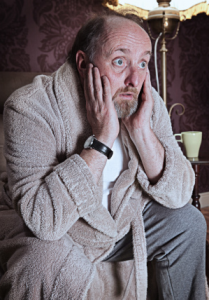 The gradual changes in the eye as we age cause it to be less effective in letting critical wavelengths of light in, and this leads to insomnia, according to researchers in Sweden.
The gradual changes in the eye as we age cause it to be less effective in letting critical wavelengths of light in, and this leads to insomnia, according to researchers in Sweden.
As we age, the lens in our eye gets less and less flexible. It also becomes more and more yellow and the pupil itself begins to narrow. All this spells defeat for the photoreceptors in the retina that are especially sensitive to blue spectrum light.
This light and the photoreceptors that need it are a critical piece in communication with the brain that tells it the early part of the day means energy and activity, and the evening means relax, recharge and recuperate.
Scientists looked at participants who had cataract surgery to remove occluded lenses and replace them with new, clear ones. The occurrence of insomnia in subjects who had no vision issues was far lower in age mates who had less availability of light on the photoreceptors in the eye, leading to the conclusion that the more light the brain is able to receive through the eye, the better sleep quality they will enjoy.
Our all-natural Insomnia program tackles this problem as well as other causes for insomnia. Learn more about this revolutionary Insomnia program here…

 Overcoming IBD
Overcoming IBD Multiple Sclerosis
Multiple Sclerosis Banishing Bronchitis
Banishing Bronchitis Gum Disease Gone
Gum Disease Gone Overcoming Onychomycosis
Overcoming Onychomycosis Neuropathy No More
Neuropathy No More The Prostate Protocol
The Prostate Protocol Brain Booster
Brain Booster
 Ironbound
Ironbound
 Solution for Shingles
Solution for Shingles
 The Bone Density Solution
The Bone Density Solution
 The Ultimate Healing Protocol
The Ultimate Healing Protocol
 The Parkinson's Protocol
The Parkinson's Protocol
 The Chronic Kidney Disease Solution
The Chronic Kidney Disease Solution
 Overthrowing Anxiety
Overthrowing Anxiety The Fatty Liver Solution
The Fatty Liver Solution The Hypothyroidism Solution
The Hypothyroidism Solution
 The End of Gout
The End of Gout The Blood Pressure Program
The Blood Pressure Program
 The Oxigized Cholesterol Strategy
The Oxigized Cholesterol Strategy
 Stop Snoring And Sleep Apnea Program
Stop Snoring And Sleep Apnea Program
 The Arthritis Strategy
The Arthritis Strategy The Vertigo & Dizziness Program
The Vertigo & Dizziness Program The 3-Step Diabetes Strategy
The 3-Step Diabetes Strategy Hemorrhoids Healing Protocol
Hemorrhoids Healing Protocol The Erectile Dysfunction Master
The Erectile Dysfunction Master Weight Loss Breeze
Weight Loss Breeze The IBS Program
The IBS Program The Insomnia Program
The Insomnia Program The Migraine and Headache Program
The Migraine and Headache Program The Neck Pain Solution
The Neck Pain Solution The Menopause Solution
The Menopause Solution The Ejaculation Master
The Ejaculation Master The TMJ Solution
The TMJ Solution The Acid Reflux Solution
The Acid Reflux Solution The Fibromyalgia Solution
The Fibromyalgia Solution The Psoriasis Strategy
The Psoriasis Strategy
BS science both could have a common cause of aging.
Did this research include the cured patients, though? ..
If so, this would remove the age related point raised as BS, above.
age factor decreases melatonin harmone.
yes the less life span means the more insomnia,it’s natural law.
Good information but more details should be given for the benefit of readers. Kindly repeat the programme but in more details including what readers could do to do away the insomnia.
SURELY THAT IS VERY NORMAL THESE THINGS IS GOING WITH THE AGE